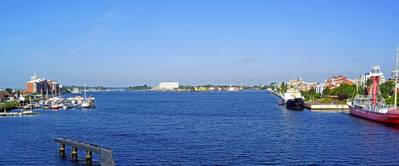Uniper Sees Merit in Building LNG Terminal at Wilhelmshaven
Germany's Uniper on Tuesday said it favors a liquefied natural gas (LNG) terminal at the Wilhelmshaven deep sea port on the North Sea coast, less than a week after peer RWE said it secured access to capacity should a rival project at Brunsbuettel go ahead.
"Wilhelmshaven in particular can be a suitable location, there are many arguments in favour of it," spokesman Leif Erichsen said in a written statement.
He cited the port's ability to offer infrastructure for LNG vessels of all sizes and its proximity to the German long-distance gas pipeline grids and underground storage caverns in the northern state of Lower Saxony where most gas is produced.
"The integration into the gas industry system would be very cost-efficient," Erichsen said.
The Handelsblatt business daily earlier reported that Uniper saw merit in Wilhelmshaven, listing it among three possible locations.
The other two are Brunsbuettel further north in Schleswig-Holstein on the mouth of the Kiel canal that links the North Sea with the Baltic Sea, and the inland Elbe river port Stade, which houses chemical companies.
The debate about German LNG imports has flared up in recent weeks as operators and the government are interested in diversifying away from pipeline gas arriving from Russia, Norway and the Netherlands.
LNG suppliers such as Qatar and the United States have said they are keen on opportunities in Germany.
The LNG business so far has not made economic sense in Germany, whose operators received small quantities through participation in Dutch and Belgian terminals.
But global gas prices have risen in the wake of oil price rallies, encouraging the development of LNG infrastructure.
At the same time, gas demand in Europe is rising and one of Germany's crucial suppliers, the Netherlands, is winding down its giant Groningen field ahead of closure in 2030 due to earthquake risks.
Uniper's wholesale trading subsidiary has experience in handling the LNG value chain - cooling gas for sea-borne transport, regasifying, delivering and storing it - worldwide.
(Reporting by Vera Eckert; editing by Thomas Seythal and Jason Neely)







